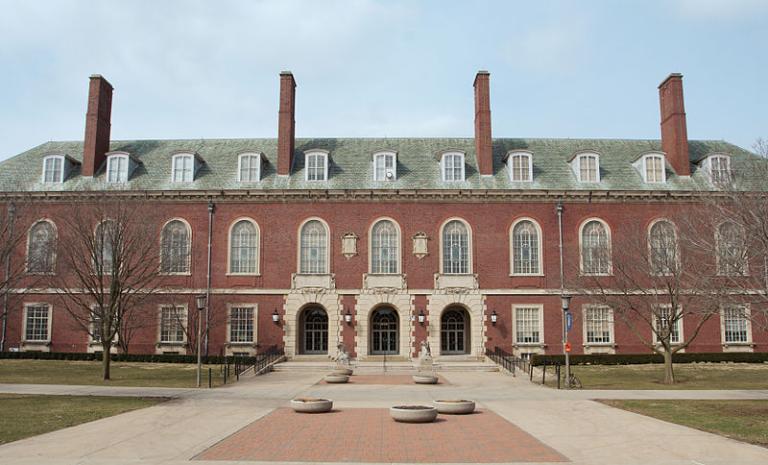![https://commons.wikimedia.org/wiki/File%3AITT_Technical_Institute_campus_Canton_Michigan.JPG; By Dwight Burdette (Own work) [CC BY 3.0 (http://creativecommons.org/licenses/by/3.0)], via Wikimedia Commons](https://wp-media.patheos.com/blogs/sites/533/2016/09/800px-ITT_Technical_Institute_campus_Canton_Michigan.jpg)
For the longest time, I couldn’t make sense of ITT Tech. After all, here in Chicago, we’ve got the IIT, or the Illinois Institute of Technology, an expensive private university which is perhaps not at the same level as MIT or CalTech, but the same idea, anyway. So what is ITT? Is it related somehow? Ultimately I googled the name and learned that it stands for International Telephone and Telegraph (nothing to do with “Illinois”!), and that’s just because the company happened to buy a for-profit college and gave it its name.
Anyway, as you may have read, the company shut down its operations just before the fall term was scheduled to begin. (See here for a report immediately after the announcement, here for a Trib report, yesterday, that the company will cease all operations, and here for a Fortune report, also yesterday, that they’re preparing to file for bankruptcy.) This was the final outcome of a chain of events which began with federal regulatory scrutiny not of its academic programs but its financial health. Like a struggling family pushed over the edge by the escalating impact of bad credit making loans ever more costly and difficult to repay, federal demands due to its finances turned them from financially weak to closed entirely. Per the New York Times,
This month, ITT was put on notice that it was in danger of losing its accreditation, which would mean an immediate cutoff in access to government loan programs. That threat helped prompt education officials to demand last week that ITT come up with an additional $153 million in credit within 30 days, to cover potential student refunds in case of a shutdown. According to its most recent quarterly filing, though, ITT had only $78 million in cash on its balance sheet.
That same article reports that ITT has been under scrutiny since 2014, but provides few details, but for an anecdotal case of a nursing student disenchanted with the poor quality of the instruction that left graduates unable to pass the nursing examinations, but who felt trapped because she couldn’t transfer her credits elsewhere.
An article in the Times from a year ago provides further context and, more interestingly, links to a report on the subject of for-profit schools converting, supposedly, to non-profit status, but with the former owners of the for-profit entity still continuing to profit as board members, through directing favorable contracts their way, and in other convoluted ways. Which doesn’t have anything to do with ITT Tech but is interesting anyway.
But you’d think that there’s no inherent reason why universities should always and only ever be non-profit (or state owned). After all, we don’t demand that our cars be made by non-profit groups, and say that there’s no way a for-profit car manufacturer could ever be trusted to provide us with a quality product.
And, realistically, as enrollment patterns change over time, and as student enrollment increases in general, if for no other reason than population growth, you’d think that for-profit companies would be a key part of a system that is responsive to student needs.
But it seems to me that there are two keys to ensuring that for-profit companies provide a quality education:
First, the refund policy must be sufficient for a student to be able to withdraw if, after an adequate length of time, the student discovers that the instruction isn’t up to snuff. What would that look like? Realistically, probably more generous than a proportionate refund, to ensure that universities, whether for- or non-profit, work at providing a quality program and students don’t stay merely because of sunk costs.
And, second, the credits earned must be transferable; nontransferability of credits seems to be the biggest difficulty, as it traps students into continuing at the school. How do you tell if credits are transferable? The ITT site was taken down fairly quickly after they shut down, so there’s not much to be learned there. At the University of Phoenix, they publish a Consumer Information Guide (is it mandatory? I don’t know), which says:
University of Phoenix has established reverse transfer agreements with partnering institutions. With a reverse transfer agreement in place, University of Phoenix will notify the partner transfer institution and provide academic records, including an official transcript, for a student who has consented to the release of his or her records to a previously attended institution who also meets certain credit requirements that indicate the student may be eligible to earn an associate degree from the transfer institution. The transfer institution may pursue communication with the student to discuss requirements and may award the associate degree to the student per its discretion after an official credit evaluation is conducted.
Sounds good, but I don’t know, and wasn’t able to find, information on how well this works in practice. Same with DeVry, what I’m finding are discussion boards complaining that, in practice, universities only accept transfer credits as electives. And some time ago, I remember reading about a student who completed an entire bachelor’s program at a for-profit school, discovered that she couldn’t find a job nor could get get admission to grad school with her degree, and, incredibly, continued on at the same school’s graduate program rather than recognize that she needed to start over elsewhere.
As it happens, various of the top hits in a google news search for the school are articles about community colleges offering to work with ITT students to help them transfer credits into programs they offer, either directly or via waived fees for credit-by-examination options. Here’s an example from the St. Louis Post-Dispatch:
ITT Tech students have a few issues when it comes to transferring classes. First, the defunct college makes a point of saying that credits likely won’t be transferrable. That’s not the case for many local schools, including St. Louis Community College, that are finding equivalencies between courses so students can carry as many credits as possible toward a new degree. . . .
Jefferson College, a community college in Jefferson County, is also ready; so is Ranken Technical College and even Webster University, which allows students to transfer in as many as 30 credits that meet the university’s program demands.
Both Jefferson College and Ranken are working to identify what courses and credits can reasonably transfer. At Ranken, Missy Borchardt, dean of enrollment management, said credit-by-assessment exams will be the best bet for ITT Tech students. Ranken is waiving fees for ITT Tech students to take such exams to figure out what classes will count toward their degrees.
Unfortunately, there’s an element of moral hazard here: students who were recent graduates or current students at ITT can apply to have their federal student loans discharged, unless they transfer their credits to another school. (See the official Secretary of Education notification.) I suppose in the “credit-by-assessment” case they could claim that a student is not being direct transfer credit for an ITT class, so as to preserve eligibility, but it’s a perverse incentive to walk away from everything.
But it seems to me that these two components — generous refund policies and meaningful transfer-out options — really ought to be a part of the basic requirements for any college seeking federal financial aid for its students. The latter might be difficult to work out in its particulars — how, after all, would a school document that its classes are transferable at a sufficient number of other schools? — but it’s key, because it would force companies to ensure their courses are high quality, and it would ensure that they compete to keep their students, rather than holding them with the sunk costs of nontransferable credits.
Image: https://commons.wikimedia.org/wiki/File%3AITT_Technical_Institute_campus_Canton_Michigan.JPG; By Dwight Burdette (Own work) [CC BY 3.0 (http://creativecommons.org/licenses/by/3.0)], via Wikimedia Commons













